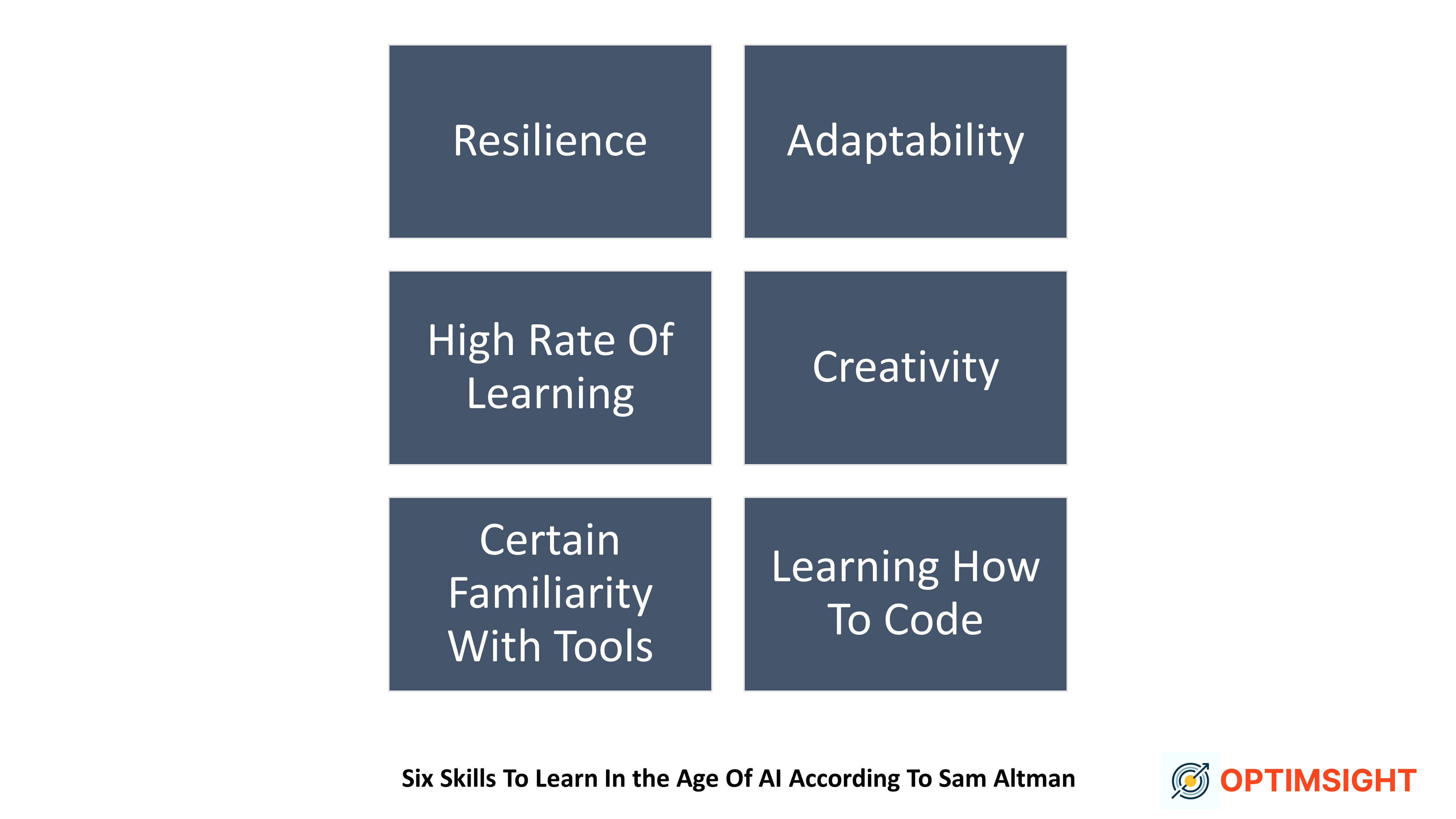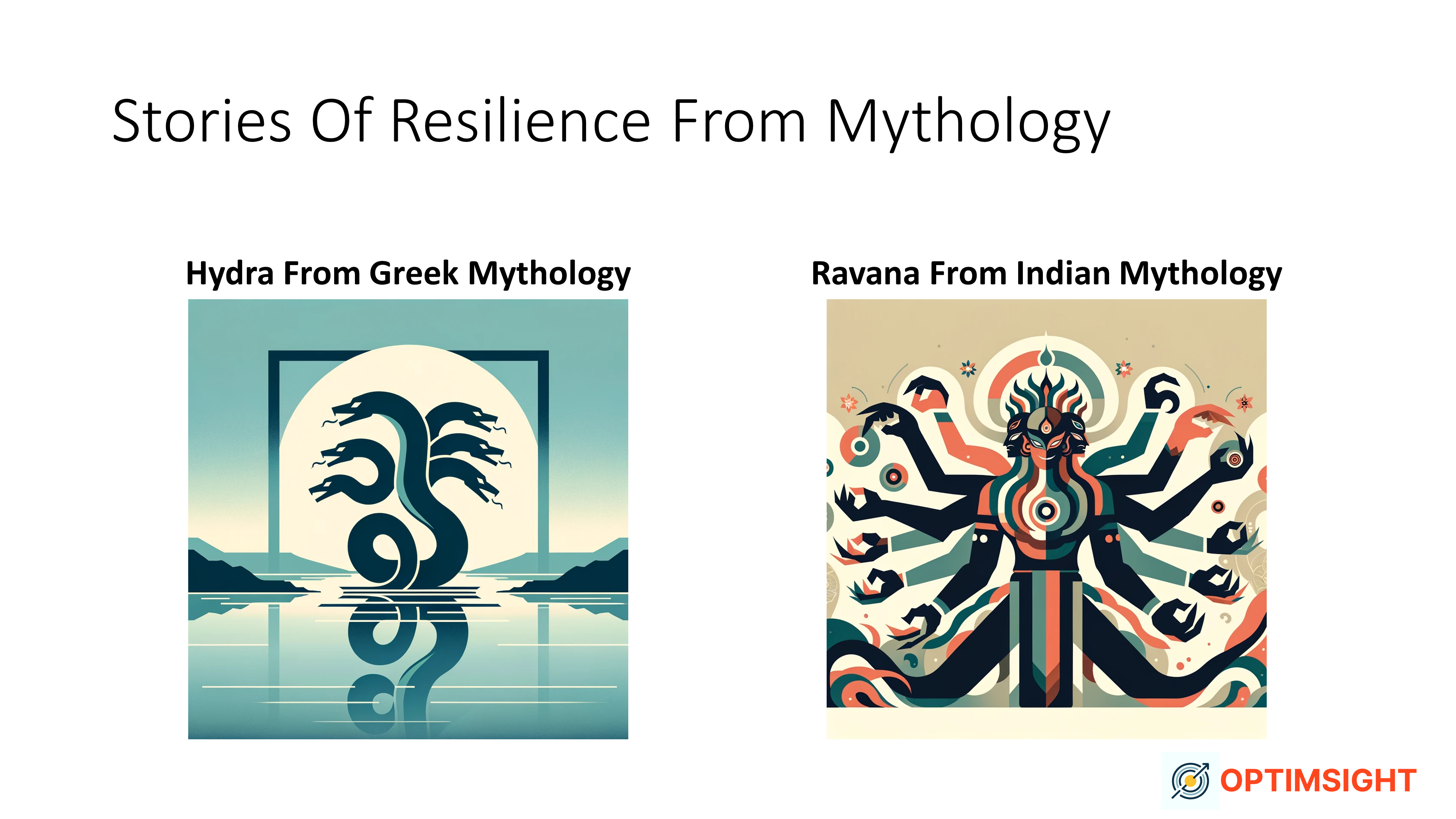February 18, 2024
8 min read
Six Skills To Learn In the Age Of AI According To Sam Altman
What skills should we learn in the age of AI? Will AI take away our jobs? Can traditional educational systems adapt to equip our children with the necessary skills to thrive in an AI first economy? These are just some of the questions we're asking ourselves in this post ChatGPT era that has seen us leapfrog in progress towards Artificial General Intelligence (AGI).

In this Bloomberg interview, Sam Altman the CEO of OpenAI - the company behind ChatGPT, had the following to say when asked about "What should kids be learning these days to prepare for an AI future?"
"Resilience, adaptability, high rate of learning, creativity, certain familiarity with the tools & learning how to code." - Sam Altman
While the question was specifically about "what kids should learn", Sam's response is broad enough to impact everyone.
Before we go deeper on each of the skills, let's pause for a moment and look at what Sam Altman did NOT say:
- You should know all about the latest and greatest machine learning & AI techniques
- You should be learning prompt engineering
- You should be a whiz at mathematics & the hard sciences
- You should be a whiz at statistics & Data Science
- You need a Masters, MBA, PhD or other advanced degrees
In this post let's attempt to go deeper on each of these six skills to see why they are important and how one can learn these skills.
1. Resilience
In Greek mythology, Hydra is a serpent-like creature that has many heads. Each time a head is cut off, two grow back.

Similarly, in Indian Mythology, Ravana is a mythical multi-headed demon-king of Lanka who has ten heads and 20 arms. During war, Ravana's enemies realize that each time they cut off a head another head grew right back.
What both of these stories from mythology have in common is the lesson about resilience.
The American Psychological Association defines resilience as follows:
"Resilience is the process and outcome of successfully adapting to difficult or challenging life experiences, especially through mental, emotional, and behavioral flexibility and adjustment to external and internal demands."
Resilience is that unique quality that makes us human. Its been pre-programmed in us by evolution. In fact, every living organism shows some form of resilience to survive.
But how can we learn this as a skill? Well, this is precisely the challenging part. There is no one size fits all solution, just some rough guidelines that can help show the path:
- Seek new experiences and challenges
- Expose yourself to new things
- Face your fears
- Hope for the best and prepare for the worst
- Study philosophy
- Have a strong support system in the form of family & friends
- Don't put all your eggs in one basket
- Develop antifragility
"Set aside a certain number of days, during which you shall be content with the scantiest and cheapest fare, with coarse and rough dress, saying to yourself the while: Is this the condition that I feared?" - Seneca
2. Adaptability
Adaptability is the ability to adjust to changing conditions, environments, or factors. Darwin's theory of adaptation explains how evolution performed adaptation for various species. For example:
- Fur, feathers, and fat to help animals keep warm in cold habitats
- Long legs to help animals escape from predators
- Camouflage to help animals hide from predators
For human beings however, our biggest strength is our brain which led to superior intelligence and our ability to cooperate together as a species.
However, like resilience this is not a skill that can be explicitly taught. Along with the suggestions above for resilience, here are a few more pointers for developing adaptability:
- Embrace change
- Keep an open mind
- Fail at a lot of things and yet keep going by learning from mistakes
- Be willing to challenge and discard your own beloved ideas
- Keep learning
- Look for disconfirming evidence
- Be curious and ask questions
- "Stay hungry. Stay foolish."
3. High Rate Of Learning
Since the dawn of the scientific revolution, human progress has been unstoppable due to our "high rate of learning" & knowledge sharing. We are in the age of AI with "knowledge workers". Just like a shark has to swim to stay alive, humans have to keep learning to survive.
Learn the method of learning says Charlie Munger:
"Alfred North Whitehead correctly said at one time that the rapid advance of civilization came only when man “invented the method of invention.” He was referring to the huge growth in GDP per capita and many other good things we now take for granted. Big-time progress started a few hundred years ago. Before that, progress per century was almost nil. Just as civilization can progress only when it invents the method of invention, you can progress only when you learn the method of learning." - Charlie Munger
Don't fear any book says Naval Ravikant:
"And the ultimate, the ultimate is when you walk into a library and you look at it up and down and you don’t fear any book. You know that you can take any book off the shelf, you can read it, you can understand it, you can absorb what is true, you can reject what is false, and you have a basis for even working that out that is logical and scientific and not purely just based on opinions." - Naval Ravikant
4. Creativity
One of the reason ChatGPT became the fastest growing consumer application in history by reaching 100 million monthly active users, just two months after launch is because ChatGPT responses are random & indeterminate.
"Our models generate new words each time they are asked a question. They don’t store information in a database for recalling later or “copy and paste” training information when responding to questions." - OpenAI
In fact, LLM's like ChatGPT have a "Temperature" parameter that controls the “creativity” or "randomness" of the text generated.
With the rise of AI, the jobs that are most likely to be automated first are those that are repetitive, less creative & utilizing skills that can be easily taught.
Like resilience & adaptability, creativity is also not a skill that can be easily taught. There are only heuristics that can guide us based on empirical evidence of what works:
- Relax your brain to think outside the box
- Be strategic about what you learn
- Go deep and go wide in your learning
- Be curious about life
- Synthesize information and try to connect the dots
- Be open to criticism and feedback from others
- Follow your natural drift
"Your work is going to fill a large part of your life, and the only way to be truly satisfied is to do what you believe is great work. And the only way to do great work is to love what you do. If you haven’t found it yet, keep looking. Don’t settle. As with all matters of the heart, you’ll know when you find it." - Steve Jobs
5. Certain Familiarity With Tools
Sam had an interesting choice of words here. Notice how he said "certain familiarity with tools" and not a "mastery of tools". Given the number of tools out there, it is very hard to develop mastery. However, if you expose yourself to the use of a wide variety of tools i.e. physical tools and cognitive tools aka mental models, over time you will develop many advantages.
But why should you develop familiarity with tools?
"Give me a lever long enough and a fulcrum on which to place it, and I shall move the world." - Archimedes
Tools create leverage. Tools help amplify impact. You can do more with less hence increasing productivity. For example, before the invention of the printing press in 1440 by Gutenberg in Mainz, Germany the spread of information and ideas was very slow. However, with this new technological tool, the spread of information and ideas was exponential leading eventually to the scientific revolution and the world as we know today.
Tools to learn come in many forms with new tools constantly being invented:
- Scientific tools
- Engineering tools
- Power tools
- Electronic devices such as computers and smartphones
- Internet
- ChatGPT
- Cognitive thinking tools aka mental models
6. Learning How To Code
Learning to code is learning to think. It helps you build structure even within your own life. When you learn to code, it is the same as learning a new language except in this case it helps you talk to a computer by passing it instructions. Like Math, you cannot just read about it. You have to learn as well as do the actual work of programming.
With "software eating the world", each one of us is increasingly interacting with complex systems that are run by algorithms. Any time you place on order on Amazon or order from a food/grocery delivery service you are setting in motion a series of computer instructions that act on your behalf.
There are several organizations dedicated to teaching coding for free. For example, code.org, Computer programming at Khan Academy & a growing list of open source courses.
"Everybody should learn to program a computer because it teaches you how to think." – Steve Jobs
"You might not think that programmers are artists, but programming is an extremely creative profession. It’s logic-based creativity." – John Romero